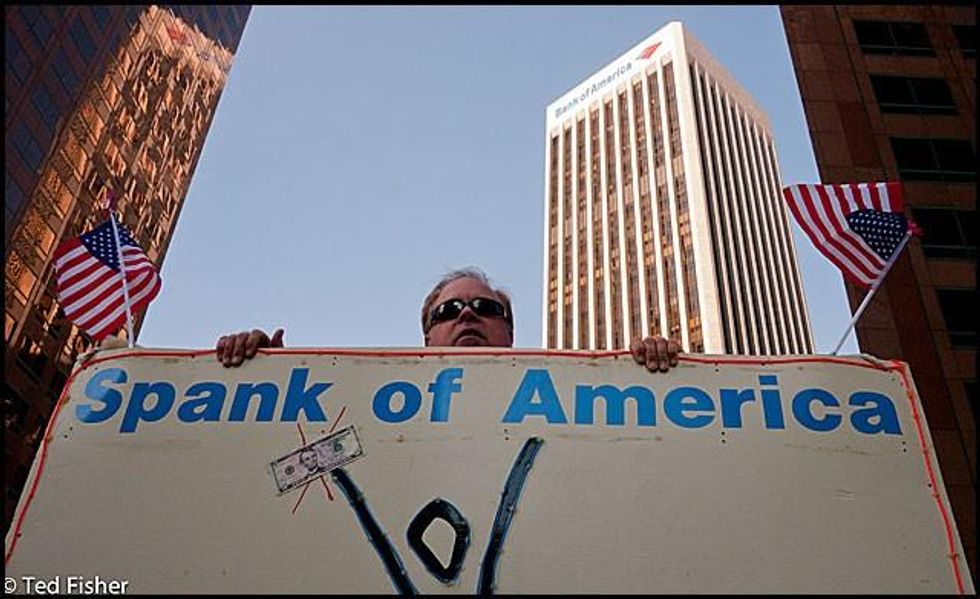No wonder the Fed and the OCC snubbed a request by Darryl Issa and Elijah Cummings to review the foreclosure fraud settlement before it was finalized early last week. What had leaked out while the Potemkin borrower reviews were underway showed them to be a sham, as we detailed at length in an earlier post. But even so, what actually took place was even worse than hardened cynics had imagined.
We are going to be reporting on this story in detail, since we are conducting an in-depth investigation. But this initial report by Huffington Post gives a window on a good deal of the dubious practices that took place during the foreclosure reviews. I strongly suggest you read the piece in full; there is a lot of nasty stuff on view.
There are some issues that are highlighted in the piece, others that are implication that get somewhat lost in the considerable detail. The first, as stressed by Sheila Bair and other observers, is that the reviews were never designed to succeed. This is something we and others pointed out; this was all an exercise in show. The OCC had entered into these consent orders in the first place with the aim of derailing the 50 state attorney general settlement negotiations. This was all intended to be diversionary, but to make it look like it had some teeth, borrowers who were foreclosed on in 2009 and 2010 who thought they were harmed were allowed to request a review. If hard was found, they could get as much as $15,000 plus their home back if they had suffered a wrongful foreclosure, or if they home had already been sold, $125,000 plus any equity in the home. Needless to say, the forms were written at the second grade college level, making them hard to answer. A whistleblower for Wells Fargo reported that of 10,000 letters, harm was found in none because the responses were interpreted in such a way as to deny harm (for instance, if the borrower did not provide dates of certain incidents, those details were omitted from the assessment).
But the results were even worse than that, hard as it is to believe. For instance, even though the OCC stipulated that the banks hire supposedly independent reviewers, they were firmly in control of the process. From the article, describing the process at Bank of America, where a regulatory advisory firm Promontory was supposed to be in charge:
Bank of America contractors were reviewing Bank of America loans at a Bank of America facility under the management of full-time Bank of America employees. They were reporting those results to Promontory, the outside independent consultant, whose employees started their reviews based on what Bank of America contractors had concluded.
As the auditor, Promontory had authority to overrule any conclusion drawn by a Bank of America contractor. Promontory has defended its work as independent from influence by Bank of America. But the Bank of America contractors said it was clear to them that what they noted during their reviews was integral to the process. They continued to do substantive, evaluative review work until a few months ago, they said, when they were told that their job going forward was simply to dig up documents for Promontory.
Of course, Promontory protests that it was in charge. It is hard to take that seriously when no one from Promontory was on premises. And the proof is that the Bank of America staff suppressed the provision of information:
Another contract employee recounted the time he noted in a file that he couldn't find vital documents, such as notice supposedly sent to a homeowner that a foreclosure was pending. "Change your answer," he said he was told on several occasions by his manager.
Second is that the OCC was changing the goalposts as the reviews were underway. But was that due to OCC waffling or pushback by the consultants acting in the interest of the banks to derail the process by making the results inconsistent over time? If you do the first month of reviews under one set of rules and then get significant changes in month two, that implies you have to revise or redo the work in month one. That serves the consultants just fine, their bills explode. And the banks get to bitch that the reviews are costing too much, which gives them (and the OCC) a pretext for shutting them down, which is prefect, since they were all intended to be a PR rather than a substantive exercise from the outset.
Consider this section:
From the the consultants' point of view, it was the government regulators who had some explaining to do. First there was the constant change in guidance, throughout at least the first eight months of the process, as to what they wanted the auditors to do and how they wanted them to do it, they said. The back-and-forth was so constant, one of the consultants involved with the process said that specific guidelines for determining if a mortgage borrower had been harmed by certain kinds of foreclosure fraud still weren't in place as late as November 2012.
Huh? Tell me how hard it is to determine harm. If a borrower was charged fees not permitted by statue or the loan documents, there was harm. If the fees were in excess of costs (not permitted) there was harm. If the fees were applied in the wrong order, there was harm. If a borrower was put into a mod, made the payments as required in the mod agreement, but they weren't applied properly and they were foreclosed on despite following bank instructions, there was harm. Honestly, there are relatively few cases where there is ambiguity unless you are actively trying to throw a wrench in the process, and it is not hard to surmise that is exactly what was happening. That is not to say there might not have been ambiguity on the OCC side, but it is not hard to surmise that this was contractor/bank looking to create outs, not any real underlying problem of understanding harm v. not harm.
It looks that some of the costly process changes were also due to the consultants being caught out as being in cahoots with their clients rather than operating independently:
The role of the Bank of America contract employees did not change to simply doing support work for Promontory until near the end of last year. That happened after ProPublica reported that Promontory's employees were checking over Bank of America's work, rather than conducting a fully independent review.
Finally, the article mentions (but does not dwell on) the fact that there was considerable evidence of borrower harm:
The reviewer said she found some kind of bogus fee in every file she looked at, ranging from a few dollars to a few thousand dollars. Another who looked for errors that violated state statutes estimated that 30 to 40 percent of loan files contained mistakes.
One reviewer who provided a comment that we elevated into a post was far more specific:
...in one case I reviewed the borrower paid approximately 25K to reinstate his mortgage. Then he began to make his mortgage payments as agreed. Each time he made a payment the payment was sent back stating he had to be current for the bank to accept a payment. He made three payments and each time the response was the same. Each time he wrote and called stating he had sent in the $25K to reinstate the loan and had the canceled check to prove it. After several months the bank realized that they had put the 25K in the wrong account. At that time that notified him that they were crediting his account, but because of the delay in receiving the reinstatement funds into the proper account he owed them more interest on the monies, late fees for the payments that had been returned and not credited and he was again in default for failing to continue making his payment. The bank foreclosed when he refused to pay additional interest and late fees for the banks error. I was told that I shouldn't show that as harm because he did quit making his payments. I refused to do that.
There was another instance when there was no evidence that the bank had properly published the notice of sale in the newspaper as required by law. The argument the bank made when it was listed as harm to the borrower was "here is the foreclosure sale deed, obviously we followed proper procedure, and you should change your answer as to harm."
Often there is no evidence of a borrower being sent a proper notice of intent to accelerate the mortgage. When these issues are noted in a file we are told to ignore them and transfer those files to a "special team" set up to handle that kind of situation. You choose whatever meaning you like for that scenario.
To add insult to injury, the settlement fiasco was shut down abruptly without the OCC and the Fed coming with a method for compensating borrowers. So the records have been left in chaos. That pretty much guarantees that any payments will be token amounts spread across large number of borrowers, which insures that borrowers that suffered serious damage, such as the case cited above, where the bank effectively extorted an extra $25,000 from a borrower before foreclosing on him, will get a token payment, at most $8,000 but more likely around $2,000. Oh, and you can be sure that the banks will want a release from private claims as a condition of accepting payment. $2,000 for a release of liability is a screaming deal, and it was almost certainly the main objective of this exercise from the outset. Nicely played indeed.




